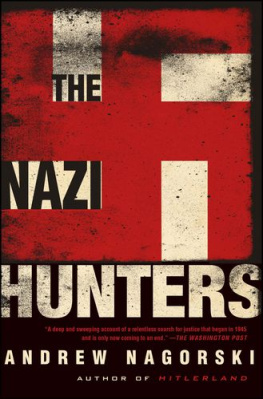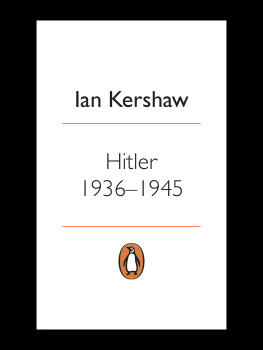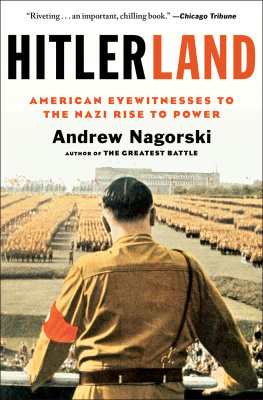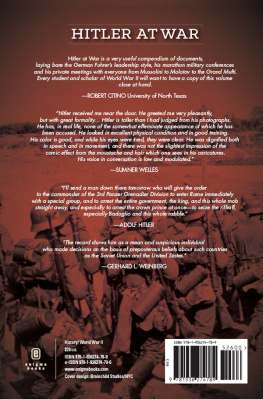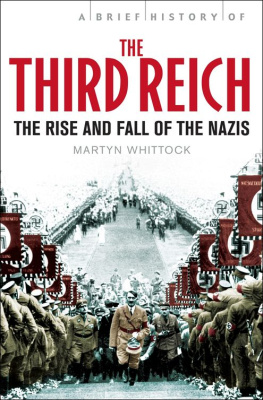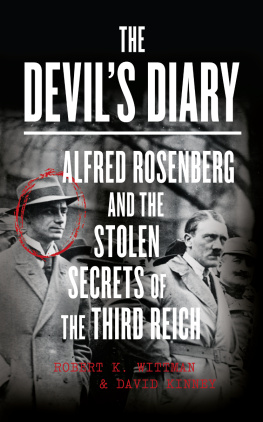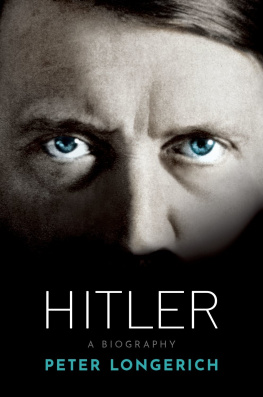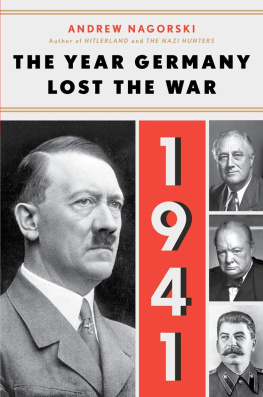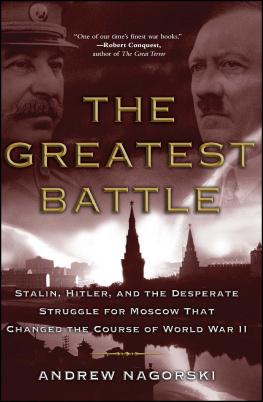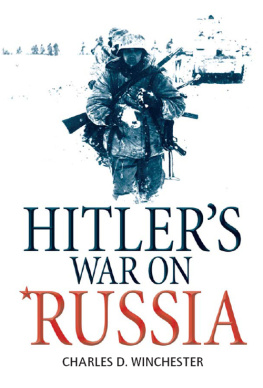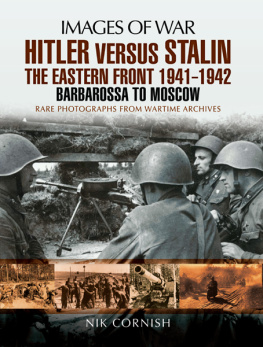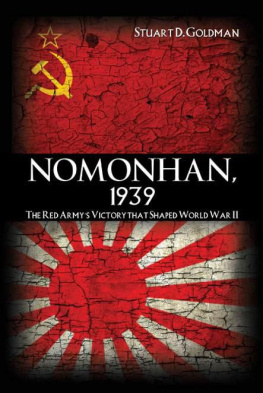ALSO BY ANDREW NAGORSKI
The Nazi Hunters
Hitlerland: American Eyewitnesses to the Nazi Rise to Power
The Greatest Battle: Stalin, Hitler, and the Desperate Struggle for Moscow That Changed the Course of World War II
Last Stop Vienna (A Novel)
The Birth of Freedom: Shaping Lives and Societies in the New Eastern Europe
Reluctant Farewell: An American Reporters Candid Look Inside the Soviet Union

Simon & Schuster
1230 Avenue of the Americas
New York, NY 10020
www.SimonandSchuster.com
Copyright 2019 by Andrew Nagorski
All rights reserved, including the right to reproduce this book or portions thereof in any form whatsoever. For information, address Simon & Schuster Subsidiary Rights Department, 1230 Avenue of the Americas, New York, NY 10020.
First Simon & Schuster hardcover edition June 2019
SIMON & SCHUSTER and colophon are registered trademarks of Simon & Schuster, Inc.
For information about special discounts for bulk purchases, please contact Simon & Schuster Special Sales at 1-866-506-1949 or .
The Simon & Schuster Speakers Bureau can bring authors to your live event. For more information or to book an event, contact the Simon & Schuster Speakers Bureau at 1-866-248-3049 or visit our website at www.simonspeakers.com.
Interior design by Lewelin Polanco
Jacket design by Jim Tierney
Jacket photographs: Hitler By Bet Tmann/Getty Images;
Roosevelt by Oscar White/Getty Images;
Churchill by Atl As Photo Archive /Alamy Stock Photo; Stalin By Keystone-France/Getty Images
Library of Congress Card Number: 2018030143
ISBN 978-1-5011-8111-5
ISBN 978-1-5011-8112-2 (ebook)
As always, for Krysia
CAST OF CHARACTERS
Germany
Adolf Hitler (18891945): Nazi Party leader who became chancellor in 1933 and took the additional grandiose title of Fhrer in 1934 following the death of President Paul von Hindenburg.
Joachim von Ribbentrop (18931946): foreign minister who signed the German-Soviet Nonaggression Pact in 1939, which set the stage for Germanys invasion of Poland that marked the start of World War II. He was the first of the major Nazi war criminals to be hanged in Nuremberg.
Albert Speer (19051981): Hitlers chief architect and, later, from 1942 to 1945, his minister of armaments and war production. Tried and convicted in Nuremberg for war crimes and crimes against humanity, he served a twenty-year sentence in West Berlins Spandau Prison.
Franz Halder (18841972): chief of the German armys general staff from 1938 to 1942. Although he worked closely with Hitler during that critical period, he was later implicated in the July 20, 1944, plot to assassinate Hitler and sent to the Dachau concentration camp. After the war, he testified in Nuremberg against the Nazi leaders on trial there. His war diaries have proved invaluable to historians of the Third Reich.
Heinz Guderian (18881954): the commander of panzer units and proponent of the blitzkrieg (lightning war) tactics that were employed so effectively in the initial German conquests of World War II. An early favorite of Hitlers, Guderian repeatedly clashed with the German leader over his handling of the invasion of the Soviet Union. In December 1941 Hitler dismissed him, but Guderian was recalled to wartime duty in 1943.
Georg Thomas (18901946): the German army general who was the chief economist of the Wehrmacht (the armed forces) and a longtime specialist in procurement. Thomas tried to warn Hitler of the dangers of launching a wider war but later helped design the Nazis Hunger Plan for the Soviet Union. Implicated in the July 20, 1944, plot to assassinate Hitler, he was arrested and held prisoner until the end of the war. He died in American captivity in 1946.
Soviet Union
Joseph Stalin (18781953): general secretary of the Communist Party and, as of May 1941, premier of the Soviet Union.
Vyacheslav Molotov (18901986): close associate of Stalin who held a variety of top Communist Party and state posts. As foreign minister, he was most famous for signing the German-Soviet Nonaggression Pact, also known as the Molotov-Ribbentrop Pact. Expelled from the Communist Party in 1962 as a result of de-Stalinization, he was reinstated in the Party in 1984, two years before his death.
Georgy Zhukov (18961974): chief of the general staff and Stalins top general who led the defense of Moscow and other major campaigns all the way up to the drive on Berlin in 1945.
Anastas Mikoyan (18951978): Politburo member and member of the State Defense Committee, among other assignments. Despite his long association with Stalin, the Armenian old Bolshevik outlasted him biologically and politically, participating in Nikita Khrushchevs de-Stalinization campaign.
Ivan Maisky (18841975): Soviet ambassador to the United Kingdom from 1932 to 1943. In his extensive diaries, he chronicled his frequent interactions with British officials from Winston Churchill on down. He later participated in the Yalta and Potsdam Conferences. In 1952, shortly before Stalins death, he was arrested and accused of espionage and participation in a Zionist conspiracy. He was released in 1955.
Britain
Winston Churchill (18741965): prime minister from 1940 to 1945, and from 1951 to 1955.
Anthony Eden (18971977): foreign secretary from 1935 to 1938, 1940 to 1945, and 1951 to 1955. Succeeded Churchill as prime minister from 1955 to 1957.
Lord Beaverbrook, William Maxwell Aitken (18791964): Canadian-British newspaper publisher who was an early supporter of appeasement but then held a variety of positions in Churchills War Cabinet: minister of aircraft production, minister of supply, and minister of war production. Along with Averell Harriman, he led the Anglo-American delegation to meetings with Stalin in Moscow in 1941.
Lord Ismay, General Hastings Ismay (18871965): Churchills chief military adviser, who supported providing aid to the Soviet Union but was wary of Stalins political and territorial ambitions. In 1952 he became the first secretary general of the North Atlantic Treaty Organization (NATO).
Harold Nicolson (18861968): Conservative member of Parliament (MP) and staunch supporter of Churchill, who also worked in the Information Ministry. His diaries and letters provide revealing testimony about the atmosphere in wartime London.
John Colville (19151987): Foreign Office staffer who was assigned to 10 Downing Street at age twenty-four in 1939. When Churchill took office in 1940, Jock Colville worked closely with him on a daily basis, serving as his principal private secretary. He, too, kept detailed diaries.
United States
Franklin Delano Roosevelt (18821945): president from 1933 to his death early in his fourth term in 1945.
Harry Hopkins (18901946): Roosevelts close adviser who embarked on special missions to London and Moscow. As the presidents personal representative to Britain, he cultivated strong personal ties with Churchill. He oversaw the Lend-Lease program and advocated unconditional aid to Stalins Soviet Union.
W. Averell Harriman (18911986): dispatched by Roosevelt to Britain to handle all Lend-Lease matters there, since Hopkins was only an occasional visitor. Along with Lord Beaverbrook, he led the Anglo-American delegation to Moscow, where the two men held extensive talks with Stalin.
John Gilbert Winant (18891947): former Republican governor of New Hampshire and Roosevelts pick as ambassador to Britain, succeeding the defeatist Joseph Kennedy. He also developed an excellent rapport with Churchill.
Next page
